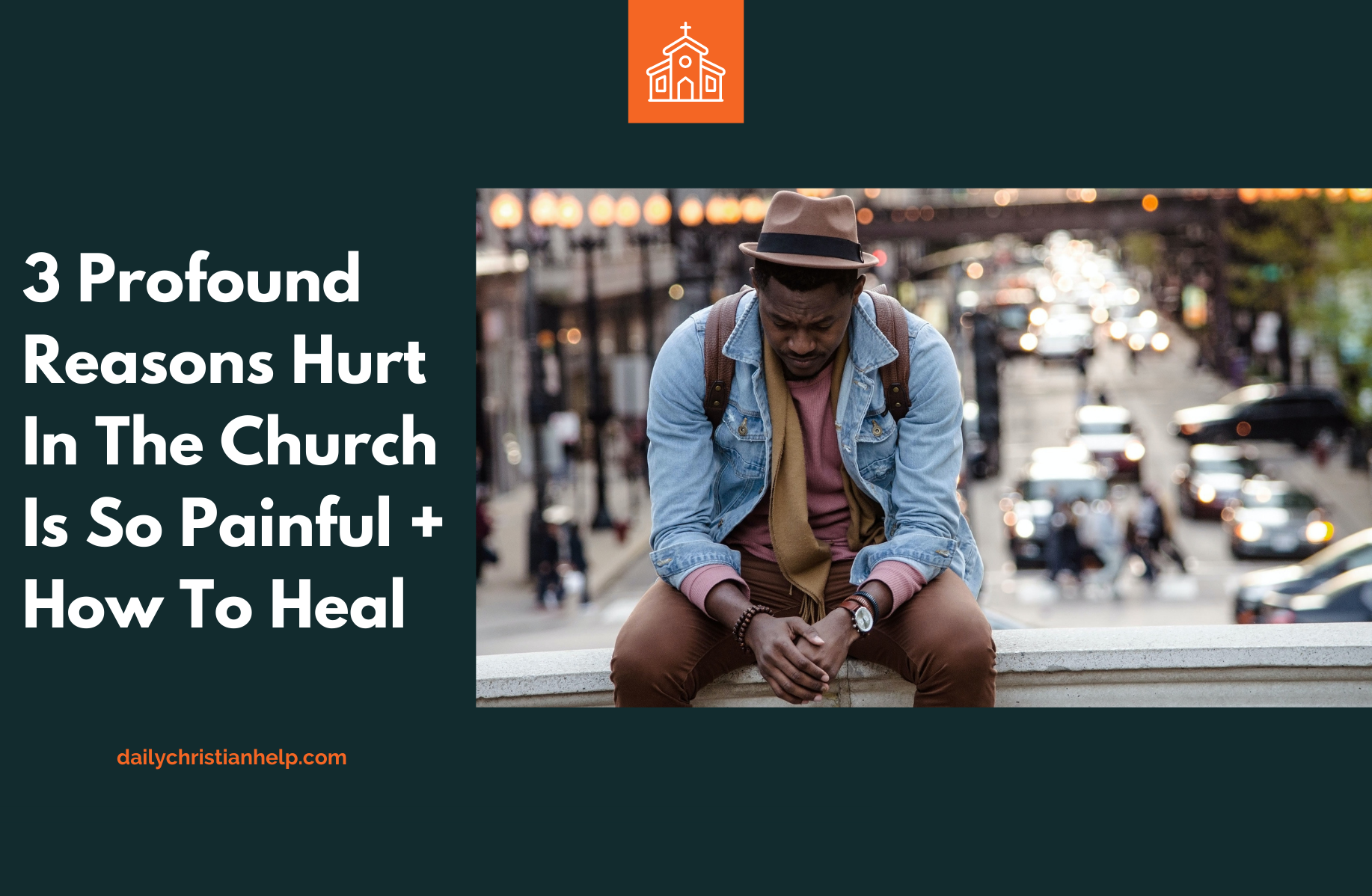Life offers very few sanctuaries. Places or communities where people can feel genuinely welcomed, vulnerable, cared for, seen, and heard. When we find a safe haven, it is natural to build our life around it with our time, energy, and resources.
For many, their church becomes an integral part of their life, as it becomes a place of healing, community, and hope that help anchor their faith. But what happens when you experience hurt in the church? It can no longer feel safe when a place of refuge and belonging disregards or rejects you.
Church hurt is a shared experience. In all types of churches, people of all walks of life, from parishioners to the senior pastor, can experience hurt in the church.
You can overcome hurt in the church. Recovery will require vulnerability to allow yourself to process the hurt by feeling the emotions, communicating your thoughts, receiving outside perspective, and choosing to forgive all in time.
The answer to overcoming hurt in the church may sound easier said than done, but rest assured, you are not the only one who has dealt with this, and because we live in an imperfect world, you won’t be the last. It is possible, though it may be challenging.
Additionally, before looking further into the content below, it will be helpful for you to clarify the type of hurt you have experienced.
Distinguishing between spiritual abuse, trauma, interpersonal communication problems, and other disappointments can help you access the necessary steps for healing.
While all pain hurts, recovering from hurt in the church requires nuance and discretion.
Initiating the following steps can be helpful for anyone who is hurt by the church.
Whether you remain at the church where you experienced hurt or decide to move on, there are ways to help you keep your relationship with the Church intact.

Why Does Hurt In The Church Cut So Deeply?
Biblically, the church is more than a weekend gathering, a place to learn, or a space for confession. The Church is also a collection of people who express faith in Christ by worshipping together, accepting one another, caring for one another, bearing with one another, and carrying one another’s burdens.
The human body has many parts, but the many parts make up one whole body. So it is with the body of Christ. Some of us are Jews, some are Gentiles, some are slaves, and some are free. But we have all been baptized into one body by one Spirit, and we all share the same Spirit. – 1 Corinthians 12:12-13
While believers experience rebirth in Christ alone, the Church plays a significant role in planting and fostering this relationship. There is a dynamic within the Body of Christ that unites, brings together, and encourages support within the whole.
Church hurt is painful because it disorients our thoughts and feelings about what we believe the Church should be and how it should treat one another.
Typically, we think of ‘pain’ caused by physical events — breaking an arm, stepping on broken glass, getting stung by a bee — but purely interpersonal events can hurt as much as physical experiences. – Mark Leary, Ph.D.
Social pain is just as real as physical pain, and people in the church are just as susceptible to it as everyone else – maybe more so.
When a person’s feelings are hurt, the area of the brain responsible for the affective component of pain is activated. That is, they experience the psychological distress of pain. – The Great Course Daily
There are few organizations where people develop interpersonal relationships as profoundly as a church. Vital aspects of individual lives are woven together in faith, service, friendship, sacrifice, and community.
Experiencing hurt in the church cuts deeply because it frays and, in some cases, severe components of life essential to our well-being.

What Is Church Hurt?
Church hurt is pain that individuals experience through conflict with another person(s) in their place of worship. It is significant enough that those hurting begin to question, doubt, or even reject the purpose and necessity of a church home in their life.
Church hurt strictly involves interpersonal dynamics between members within a body and can represent congregation members, volunteers, leadership staff, and senior leaders. In other words, all parties can experience trauma in the church.
Ultimately, church hurt is a result of broken trust. Growing relationships require healthy amounts of trust; however, it can lead to feelings of anxiety or resentment when it is broken.
One of the most difficult situations is when someone breaks trust with us. It could involve lying, unfaithfulness, or betrayal in some way. And it can be devastating. It isn’t easy because one of our most fundamental needs for survival is trust. Without trust, we don’t know who the other person is anymore. – drtownsend.com
When a person breaks our trust, it changes our perception of who we think someone is; it’s almost as if they appear different. Sometimes, they become unrecognizable compared to the original image in our minds.
If The Church, a church, members in a church, or leaders of a church become something or someone that feel as if we no longer know or can trust – the effects can be devasting.
Trust isn’t just important for couples. It’s also vital to neighborhoods, states, and countries. Trust is central to what makes human communities work. – John Gottman
For individuals and churches to thrive, trust is a necessary component. When church hurt occurs, it can mar one’s perspective of those they trust within their faith community, even God. In some cases, hurt in the church causes distance, confusion, or separation between individuals and the body.

What Is The Impact Of Church Hurt?
The threat of church hurt is that it can disrupt the spiritual condition of those suffering. It can hinder people’s walk with God, end friendships, or lead to serious long-term effects in severe traumatic cases. It is also one of the common factors for those experiencing Christian deconstruction.
Three Profound Ways Hurt In The Church Takes A Toll On People
1. Spiritual Health
Our close relationships with family, friends, and spiritual leaders often influence our perception of God’s image. If broken trust can distort our perception of others, experiencing hurt in God’s house at the hands of His children and leaders can also contort one’s view of God.
Relatively minor church hurts can leave us with a burned-out feeling during service, while the more serious wounds can leave us soul-scarred and physically sick at the thought of walking in the church doors.
Far from being innocuous, the pain can open us up to various temptations: sitting in judgment over the church and its struggles, refusing to participate in any church ministries that are not up to par, tearing the church down with our words, or even withdrawing from the church altogether. – desiringgod.org
The ability to guard one’s heart while simultaneously practicing vulnerability with those they trust is a spiritual discipline that takes time to develop. Discerning the actions or words of others and protecting the impact it has on the condition of your soul to preserve your spiritual health is necessary yet tricky to do.
2. Relational Health
Conflict in most human relationships is inevitable; however, when disagreement, misunderstandings, or abuse result in cutting ties among friends, it is a confusing situation.
After a friendship breakup, it’s common to feel anger, sadness, loneliness, and anxiety about seeing the person and fearful of mutual friends picking sides, Kirmayer says. Understanding that these feelings are normal will help you start moving forward. – time.com
The relational dynamics within a church are complex, and they typically run deep for those who experience hurt. Separating or ending friendships among circles referred to in the Bible as family, a body, and a Bride is disorienting.
The Church is a place that welcomes God’s unifying presence; however, when pain occurs in the Body, it hurts.
3. Mental Health
When hurt in the church leads to the loss of friendships, influence, a place of worship, or community, its impact is significant. People can experience grief with any measure of loss in their life.
You may associate grieving with the death of a loved one—which is often the cause of the most intense type of grief—but any loss can cause distress.
Even subtle losses in life can trigger a sense of grief. For example, you might grieve after moving away from home, graduating from college, or changing jobs. Whatever your loss, it’s personal to you. – helpguide.com
Feelings like sadness, loneliness, disbelief, shock, anger, or guilt are normal responses to grief. Your spirituality cannot isolate you from the human experience of emotions, nor should it.
Losing a church community that has helped you process your pain in the past hurts and can create disillusionment concerning your relationship with it.
How hurt in the church can affect people are immeasurable as everyone experiences and respond to pain differently. For sure, there are repercussions that impact the health of three critical areas of an individual’s life to varying degrees.

Who Can Experience Hurt In The Church?
Members, volunteers, ministry leaders, staff leaders, and senior pastors can all experience hurt in the church. Typically, church hurt is explained through negative experiences that members suffer because of ill-advised, wrong, or downright abusive leadership. However, the overall conversation concerning church hurt can widen to make room for pastors and leaders.

Members & Volunteers Can Experience Church Hurt
There are too many stories to count that have made headlines concerning high-profile church leaders’ abusive, negligent use of power and leadership. Unfortunately, these situations can and do occur in smaller, less recognized churches all the time too.
The Church Can Hurt Pastors & Ministry Leaders
Many pastors have church members who try to manipulate them, criticize their leadership, downplay their careers, complain about initiatives, comment about expenditures, attack their character, or even gossip about their families.
Granted, receiving criticism and comparison come with leadership territory, but the sting of a few consistent remarks can quickly compound into painful wounds.
The constant criticism many pastors face is basically death by a thousand cuts. – churchanswers.com
As a former pastor, I can assure you that some sheep have teeth more like wolves than lambs. Well-meaning ministry leaders can experience harm from those they want to serve and help.
It’s a fair assessment that anyone can experience hurt in the church – from the top down. Practicing empathy toward those we serve, admire, and go to church with can go a long way.
Toxic Behavior That Cause Hurt In The Church
Any organization made up of people, even churches has the potential for conflict and hurt feelings. Unfortunately, people are flawed, make mistakes, and are capable of inflicting pain. However, this does not excuse habitual toxic behavior in a church environment.
There is a vast difference between experiencing conflict or tension in a church and a cycle of toxic behavior unchecked and unchanged.
It is vital for people who are hurt to distinguish between ongoing, toxic behavior that poisons a church and a hurtful situation. Unhealthy behavior is not the pastor forgetting your name or to say hi, being passed up for a position, or isolated miscommunications and misunderstandings.
A church or a denomination is a system. It consists of people standing together under the name of God for the purpose of educating, nurturing, and blessing others spiritually. Systems are meant to benefit and bless. But like individuals, a system can misuse its authority, crushing those in its care. – erlc.com
Recognizing Patterns Of Toxic Behavior In A Church:
- Abusive Leadership (verbal, emotional, spiritual, sexual, or physical)
- Control Issues
- Denial
- Rejects Feedback
- Bullying
- Unhealthy Staff Culture
- Staff Turnover
- Fighting and Arguing
- Gossip (character assassination, slander, name-calling)
- Manipulative Tactics
- Continuous Complaining
- Self-Serving Policies
- Little To No Accountability
- Insulated Leadership Circles
- Repeating The Same Mistakes
A pattern is revealed as decisions are made, and actions are taken to benefit or preserve the leader rather than care for the followers. The leader—and others with power—believe that if he fails, the whole system everyone has worked so hard to build will go down. The system is protected rather than the sheep. – erlc.com
If you are in an environment where one or more of these things are taking place, prayerfully consider your involvement and the potential conversations that need to take place to resolve any church leadership problems.
Respectfully and privately address your concerns with appropriate channels of leadership. If leadership dismisses your input or you later find that there is no action to resolve the issues, you might consider finding another community.
You do not need to be a victim. You have the power to change your circumstances. Unfortunately, we may not always have the position to break cycles of toxic behavior in others, but we do have the ability to remove ourselves from an unhealthy environment.
Thankfully, this behavior does not reflect God’s character or the global Church. However, it can represent a particular church community and even pockets of the Body of Christ.

How To Overcome Being Hurt in the Church
Overcoming being hurt in the church will require facing your feelings, considering your perspective, forgiveness, and ultimately choosing to value the Church rather than abandon it – whether in the community you’ve experienced hurt or in a new local setting.
Seeing the church in a different light than before, although it may sound bizarre, can be good. It means that you have the opportunity to set different expectations when it comes to the church, the people within it, and the leaders.
Establishing healthy boundaries and expectations for your church can allow you to participate, worship, serve, give, receive, and involve yourself while keeping your heart safe.
You can heal from being hurt in the church. Maintaining your commitment to Christ and love for the Church is possible while staying connected to a local body, even if it’s the one you’ve experienced hurt. Below are six redemptive ways to overcome church hurt, experience healing, and restore hope.
Walking through each step will help you resolve your feelings and experience a better future without having to leave the Church. There are also practical applications to help you start each step.

6 Steps To Healing From Hurt In The Church
1. Take Responsibility For The Condition Of Your Spiritual Life
You are the only one who can take action to begin mending the hurt that you feel. Ultimately, the ability to heal starts with your decision to resolve your pain.
The Lord cares about your feelings. Jesus was also betrayed by His friends, so He understands your sorrow, and He can comfort you. The Bible doesn’t condemn you for having emotions. Be careful, though, to handle your emotions well. You may recall Paul’s words:” ‘Be angry, and yet do not sin'” (Ephesians 4:26) – insight.org
Others may have hurt you but moving forward is your responsibility. This resolution does not mean that you ignore what happened, pretend that you’re not hurting, or do it alone – it does mean that you are deciding to take steps to move on.
To begin this process, identify what you want to accomplish or learn from resolving your church hurt. Write down these things, pray about them, and believe that God can heal you.
2. Acknowledge That You Hurt And Allow Yourself To Feel It
When you experience pain inflicted on you by another, the worst thing you can do is dismiss it, shove it deep down or excuse it away. It is best to allow yourself to feel the pain you experienced. If you don’t feel it, you can not confront it or move on from it.
We need to get comfortable with feeling and not always look for a happy high or a way out of the pain. We need to be okay with saying things like “I feel sad” or “I feel anxious.”
Facing and embracing our emotions is like a deep cleanse, a truly cathartic moment. To feel is to be truly alive because our emotions are very real things. – Caroline Leaf
This step requires inner work to acknowledge being hurt in the church and sit with it for some time to move into the next step, processing. It’s important to note that you should put boundaries around this step to prevent one of two scenarios:
- Not sitting with the hurt long enough to provide the material to process
- Sitting with it for too long postpones processing, turning those hurt feelings into bitterness or resentment.
Allotting a fixed amount of time is a practical tool for this step, which allows you to prepare yourself for moving to the next step properly. Every individual is unique and so ask yourself, a friend, or a counselor how much time you should take. Whatever it is will be your boundary.
Remember, the expectation is not to stop feeling after this step. This action is to help you gauge what you are feeling, how intense those feelings are, and start to understand why you might be feeling that way.

3. Process The Experience To Identify Why You Feel Hurt
Some people process best when verbalizing their pain for others’ it can help to write or think. This step can be challenging and may look different for everyone. The important thing is to find what works best for you.
Processing your hurt can take place during times of prayer. It can also happen while sitting with a trusted friend or leader. To process being hurt in the church will involve three people: yourself, God, and someone you trust.
Below are a few healthy ways to process being hurt in the church.
- Journal
- Prayer
- Counseling
- Movement & Exercise
- Read Scripture
You may be denying a reality lost long ago. You may be protesting something that will never come true. Maybe it is time to give it up. Perhaps it is time for you to mourn so that your heart can be happy again. – Dr. Henry Cloud
Fully processing your feelings should feel like a deep sigh of relief. It does not mean the pain is completely gone, but it should feel like a relieving start to healing.
In processing your feelings, ask yourself questions to understand what you feel and why you feel this way.
What are you feeling, and why do you feel it?
In some cases, your hurt could result from previous trauma triggered by a current situation. That does not mean that the current situation isn’t valid, but the past may magnify it.
You want to differentiate between what happened then and what is happening now. Doing this may bring you to a different conclusion than what happened in the past. It will also give you a greater understanding to talk about it with a trusted confidante or those who hurt you.
After processing, it is best to have a conversation with those directly involved in your hurt in many situations. If so, seeking counsel is a good idea before confronting anyone. Receiving advice or even asking an appropriate person to be a mediator between you and the other party involved is wise.
4. Choose To Forgive Others (Even If They Do Not Ask For It)
There is a saying about unforgiveness being the equivalent to drinking poison and expecting it to harm someone else. In other words, unforgiveness only hurts you.
Forgiving someone or a place that has hurt you may feel impossible; however, you can with grace and God’s help. Forgiveness relieves the burden of hurt feelings. Forgiveness is an act of choosing peace over anguish.
Extending forgiveness does not mean you are okay with what happened; just that it’s over, time to move forward, and no one owes you anything.
- Forgiveness does erase your memory of what happened.
- Sharing forgiveness does not mean you no longer exercise caution.
- Forgiving someone does not always eliminate consequences.
Offering forgiveness is a choice to provide compassion to those who’ve hurt you. Consequently, it benefits those who choose forgiveness rather than a payment.
Studies have found that some people are naturally more forgiving. Thus, they tend to be more satisfied with their lives and to have less depression, anxiety, stress, anger, and hostility. However, people who hang on to grudges are more likely to experience severe depression, post-traumatic stress disorder, and other health conditions. – hopkinsmedicine.org
Forgiveness may not be a one-time decision for you either. It may be necessary to remind yourself of your decision to forgive if the sting of hurt feelings doesn’t immediately subside.
How do you know if you’re struggling to forgive for being hurt in the church?
3 Signs You Are Holding Onto Church Hurt:
- You Feel Upset When You Think About Them
- You Find Yourself Slandering Them
- You Begin Avoiding Or Rejecting The Person
Forgiveness is not dependent on others’ actions but our attitude.
Forgiveness is a spiritual decision, not an emotional decision. The important thing is to practice patience with yourself and remember; forgiveness is a choice in word and action.

5. Challenge Your Perspective Of What The Church Is
A few things can come to mind when you think about the church. For some, it’s a collection of people who assemble to worship God and learn about the Bible.
For others, it can be an organization with a hierarchy, running like a well-oiled machine to serve the community around it. Still, some view it as a place of fellowship, friendship, and belonging.
The Church is all of those things: it is a place of belonging, worship, teaching, community, healing, service, and sacrifice. There is so much personal meaning tied to the church that any disappointment can seem catastrophic.
From a biblical standpoint, the Church is not a building but a collection of members who follow Jesus (Ephesians 5:21-33).
The church includes flawed, imperfect people – capable of making mistakes and hurting others. Like you and me, those who are working out their salvation with fear and trembling.
Keeping this perspective as the primary definition is crucial because there is no room for separation of yourself and the church.
Suppose the church is only a building, then fine, no need to be a part of it. If it’s simply an organization run by gifted leaders, dismissing yourself from it is okay. However, if the church is a collection of God’s children who gather, worship, serve, and share with each other, then as a believer, that includes you.
Church is not an event you attend; it is a family you belong to.
If you have been hurt in the church, I’m sorry. Are you willing to drop your guard a little, remove the defenses, and understand, like all families, we’re not perfect, but we do have a purpose?
Keep in mind; the Church did not hurt you. More than likely, a small segment of people or possibly a person hurt you. Can you trust that others, like yourself, need grace and understanding?
6. Reconnect With Church
Take time to recall what made church special for you in the first place. Sometimes one or two harmful incidents can overshadow many more wonderful memories. List the reasons why the church is valuable to you.
If you believe your church is safe and not a toxic place, decide to engage again wholeheartedly. Don’t disqualify yourself or others based on what happened. Ease back in if you need time to adjust, but believe that you and those in your church can work together.
Find a place to serve if you don’t have one already. Volunteering at church can give you a unique perspective and a fresh reminder that you are a part of something bigger than yourself. It may even give you renewed purpose within your community.
Instead, we will speak the truth in love, growing in every way more and more like Christ, who is the head of his body, the church. 16 He makes the whole body fit together perfectly. Each part does its own special work; it helps the other parts grow so that the whole body is healthy and growing and full of love. – Ephesians 4:15-16, NLT
Do not underestimate the power of reconnecting with the church. God wants to do a deep, authentic work within each of us. It is possible to step back into a community or relationship with fresh forgiveness and perspective. Doing so can expand your compassion, broaden your ministry, and revive your heart.
Summarizing Hurt In The Church
Now that you’ve gone through the steps and reached forgiveness, how do you move forward in the church? Revisit these steps anytime you need to ensure no residue of hurt is left over.
Though pain in this life may be inevitable, it does not have to be permanent. Being hurt in the church does not have to rob you of joy and connection to God’s people.
Overcoming church hurt does not mean you have to disqualify your feelings either. You can feel your pain, process it, forgive and move forward. You may even come out the other side with a better understanding of yourself and others around you.
Walking through these steps will help create a routine for dealing with difficult situations with others in and outside the church. Doing so can help you develop a healthy perspective and responses when you experience hurt.
The more equipped you are to deal with hurt, disappointment, or other negative emotions, the easier you can process and experience grace, peace, and mercy toward yourself and others.



